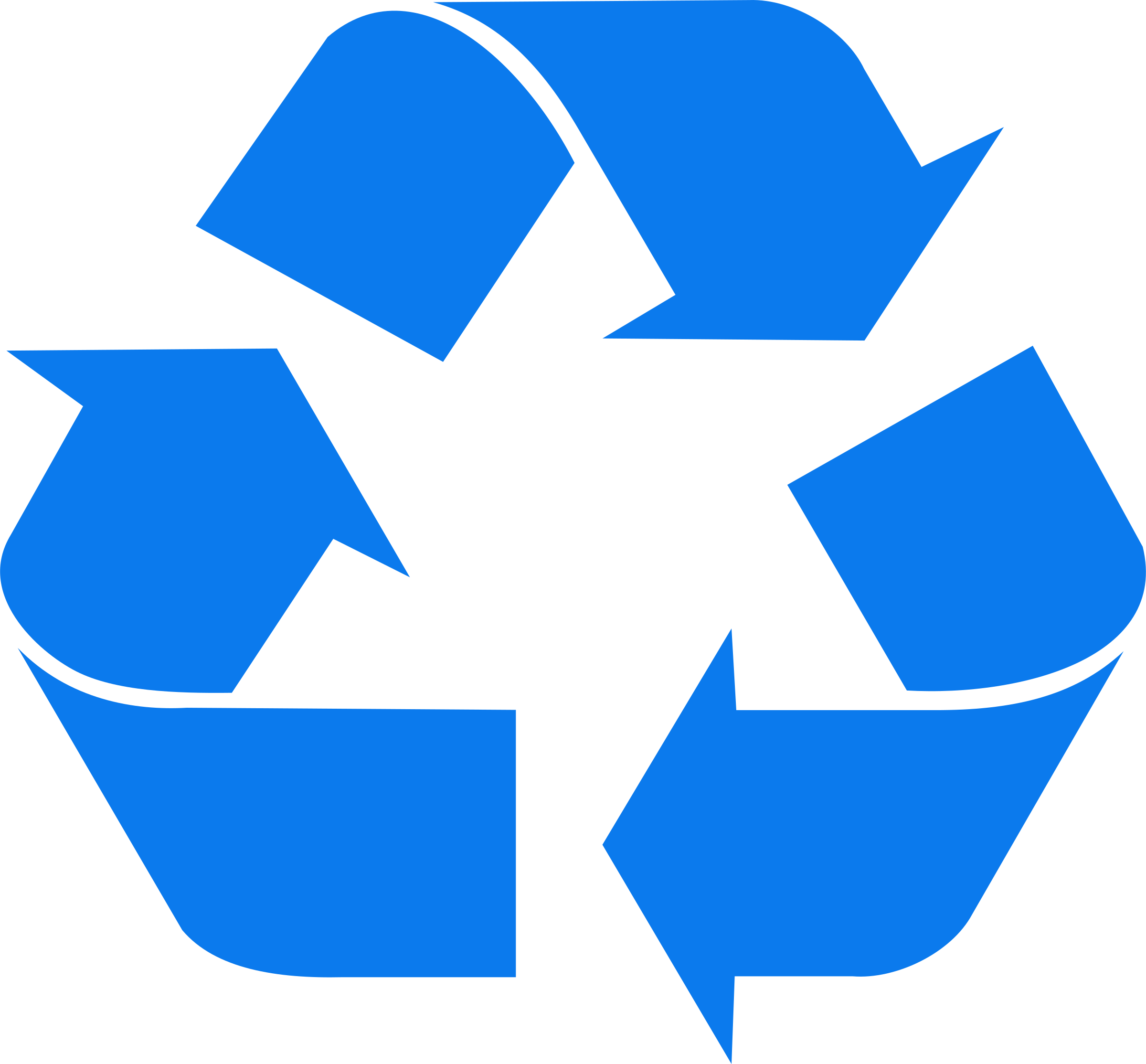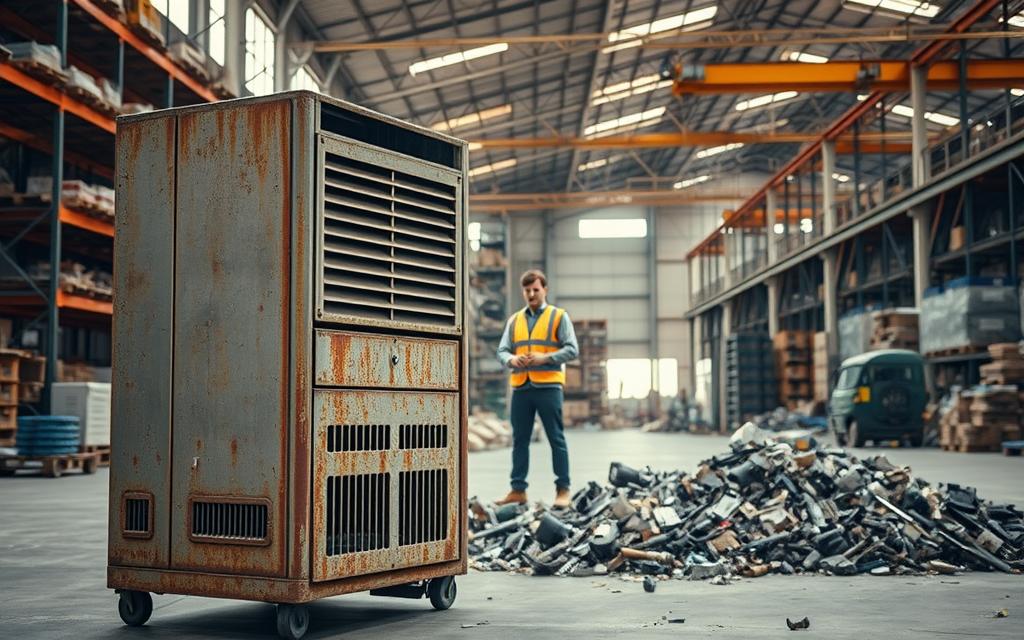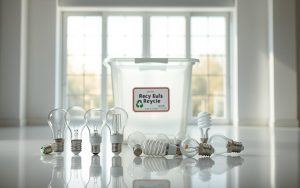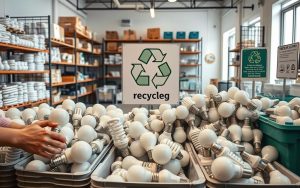Proper disposal of an old dehumidifier is crucial due to its hazardous components. Many units contain refrigerants like Freon and traces of mercury, which can harm the environment if not handled correctly. Improper disposal can lead to serious consequences, including legal penalties under Section 608 of the Clean Air Act.
Illegal dumping or DIY disposal methods pose significant risks. These actions not only endanger the environment but also expose individuals to potential fines. Professional services, such as Jiffy Junk, ensure safe handling and compliance with regulations.
Recycling options and donation strategies offer eco-friendly alternatives. Programs hosted by companies or electricity providers often provide incentives, such as rebates, for responsibly disposing of old appliances. By choosing these methods, you contribute to environmental preservation and avoid legal pitfalls.
Why Recycling Your Dehumidifier Matters
Improper handling of dehumidifiers can lead to severe environmental and health consequences. These appliances often contain hazardous materials like Freon and mercury, which can harm ecosystems and human well-being if not disposed of correctly.
Environmental Impact of Improper Disposal
Freon, a common refrigerant in dehumidifiers, contributes to ozone layer depletion. This increases UV radiation exposure, leading to climate change and ecological imbalances. Leaking refrigerants can also contaminate groundwater, posing long-term risks to water sources.
Mercury, found in older models, is another concern. When improperly discarded, it seeps into soil and water, disrupting ecosystems and entering the food chain. The EPA strictly prohibits venting refrigerants, with penalties for non-compliance.
Health Risks Associated with Dehumidifiers
Exposure to mercury can cause severe health risks, including neurological damage. Waste workers handling unprotected units are particularly vulnerable. Proper disposal methods ensure safety for both the public and those in the waste management industry.
By choosing responsible disposal, you protect the environment and prevent these hazards. Compliance with EPA regulations also avoids legal penalties, making it a win-win for everyone involved.
Understanding Hazardous Materials in Dehumidifiers
Dehumidifiers often contain materials that pose significant risks if mishandled. These hazardous materials include refrigerants and mercury, which can harm both the environment and human health. Proper disposal ensures these substances do not end up in landfills or waterways.
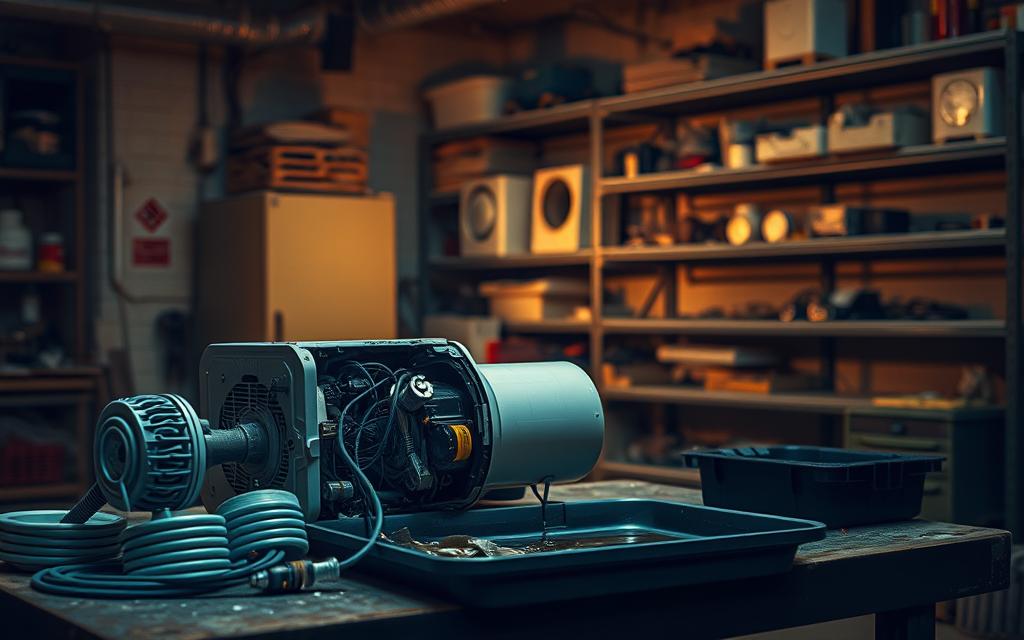
Refrigerants and Their Environmental Harm
Pre-2020 models commonly used Freon, a refrigerant known for its ozone-depleting properties. The EPA phased out Freon in 2020 due to its environmental and health risks. Modern units now use alternative refrigerants, but older models still require careful handling to prevent leaks.
Compressor leaks during improper disassembly can release harmful refrigerants into the atmosphere. This not only contributes to ozone layer depletion but also violates Section 608 of the Clean Air Act. Non-compliance can result in hefty fines.
Mercury and Other Toxic Components
Older dehumidifiers often contain mercury in switches and thermostats. This toxic metal can persist in ecosystems, contaminating soil and water. Over time, it bioaccumulates in the food chain, posing risks to wildlife and humans.
Exposure to mercury can cause severe health issues, including neurological damage. Proper disposal methods protect waste workers and prevent environmental contamination. For more details on safe disposal practices, visit Jiffy Junk’s guide.
How to Prepare Your Dehumidifier for Recycling
Preparing your appliance for disposal ensures safety and compliance. Proper steps prevent leaks, spills, and other hazards during the process. Follow these guidelines to get your unit ready for recycling.
Emptying and Cleaning the Water Tank
Start by draining the water tank completely. This prevents mold growth and ensures the unit is safe to handle. Use mild soap and water to clean the tank thoroughly. Dry it completely to inhibit bacterial growth.
Removing and Cleaning Filters
Remove the filters and clean them according to the manufacturer’s instructions. A vacuum or gentle rinse can remove dust and debris. Allow the filters to dry fully before reassembling or recycling.
Proper Handling and Transportation
When moving the unit, keep it upright to avoid compressor damage. Use straps to secure it in your vehicle and avoid tilting. Professional services like Jiffy Junk ensure safe transportation and prevent refrigerant leaks.
- Sanitize the water tank and filters to eliminate bacteria.
- Dry all components thoroughly before disposal.
- Secure the unit during transportation to prevent damage.
- Avoid DIY disassembly to prevent accidental refrigerant release.
Recycling Options for Your Old Dehumidifier
Many options exist for safely getting rid of outdated appliances. From appliance stores to municipal programs, you can find a solution that fits your needs. These programs ensure compliance with environmental regulations and prevent harmful materials from polluting the environment.
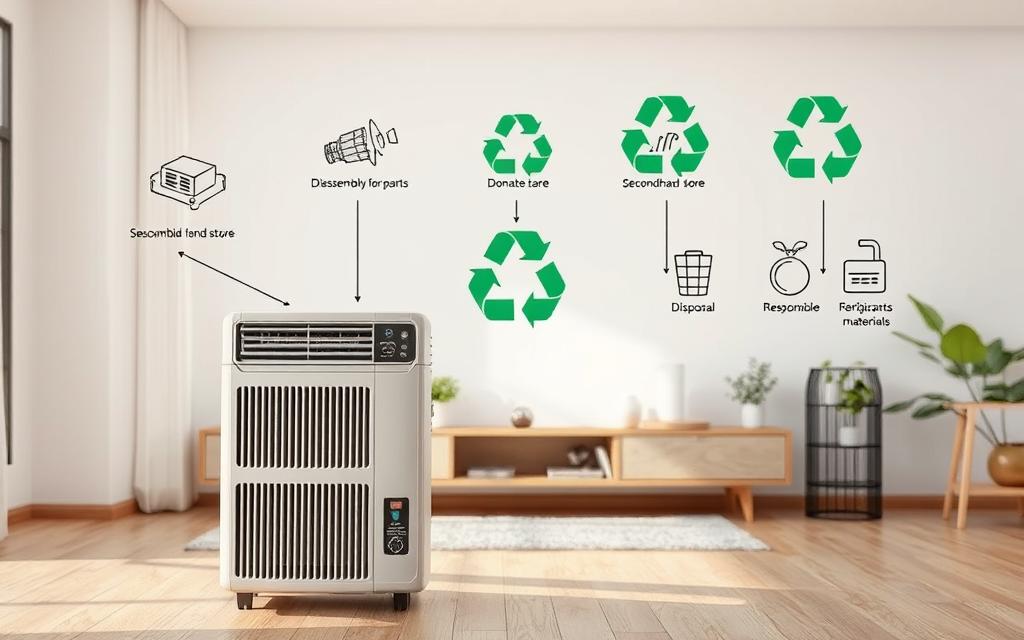
Appliance Store Recycling Programs
Major retailers like Best Buy, Home Depot, and Lowe’s offer recycling programs for old units. These programs often include rebates, making it a cost-effective choice. For example, Best Buy allows up to three appliances per day for recycling.
These stores partner with EPA RAD-certified facilities to ensure safe refrigerant recovery. This certification guarantees environmentally compliant disposal, protecting both the planet and your wallet.
Local Recycling Centers
Many communities have recycling centers that accept old appliances. These centers often provide drop-off locations and may offer bounty programs with rebates ranging from $15 to $25.
Check with your local government website to find the nearest center. Some locations may have restrictions, such as accepting only working units, so it’s best to confirm details beforehand.
Municipal Waste Management Programs
Your city or town may host seasonal e-waste collection events. These municipal programs are designed to handle hazardous materials safely and efficiently. They often partner with certified facilities to ensure proper disposal.
Participating in these events not only helps the environment but also ensures compliance with local regulations. It’s a convenient way to dispose of your old unit responsibly.
Donation and Resale: Extending Your Dehumidifier’s Life
Extending the life of your dehumidifier can benefit both the environment and your community. Instead of discarding a functional unit, consider donating or reselling it. This approach supports a circular economy, reducing waste and conserving resources.
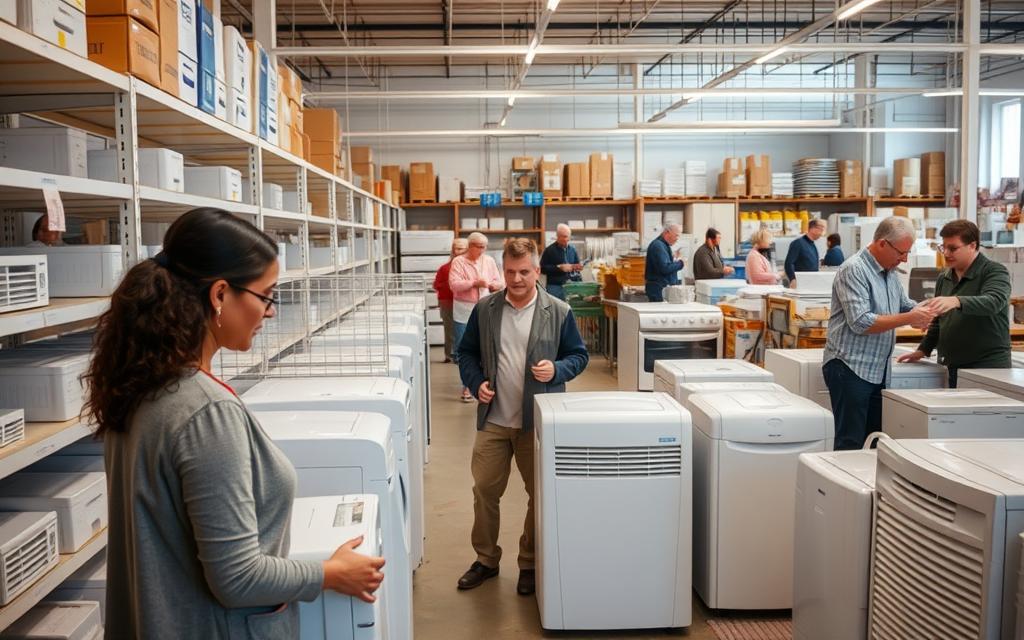
Donating to Charities and Thrift Stores
Charities like Goodwill and the Salvation Army accept functional dehumidifiers. These organizations often provide appliances to low-income households, helping families in need. Before donating, ensure your unit is less than five years old and free of leaks or malfunctions.
Donating also offers tax deduction benefits. Keep a receipt from the charity for your records. This simple act not only helps others but also reduces the demand for new materials, minimizing environmental impact.
Selling Online Through Platforms Like Craigslist
If your unit is in good condition, consider selling online. Platforms like Craigslist and Facebook Marketplace connect you with local buyers quickly. Create an effective listing by including clear photos and an honest description of the unit’s condition.
Highlight features like energy efficiency or recent maintenance. This approach not only earns you extra cash but also ensures your appliance continues to serve a purpose.
Benefits of Reusing Appliances
Reusing appliances has significant environmental benefits. For example, reusing metals like copper reduces mining demand by up to 95%. It also saves energy, as manufacturing new units requires substantial resources.
By choosing donation or resale, you contribute to a sustainable future. Your actions help reduce greenhouse gas emissions and prevent hazardous materials from entering landfills. It’s a win-win for the planet and your community.
How to Recycle a Dehumidifier: Step-by-Step Guide
Properly disposing of an old dehumidifier requires careful planning and the right resources. From finding a reliable recycling company to ensuring safe disposal, each step is crucial for environmental compliance and safety.
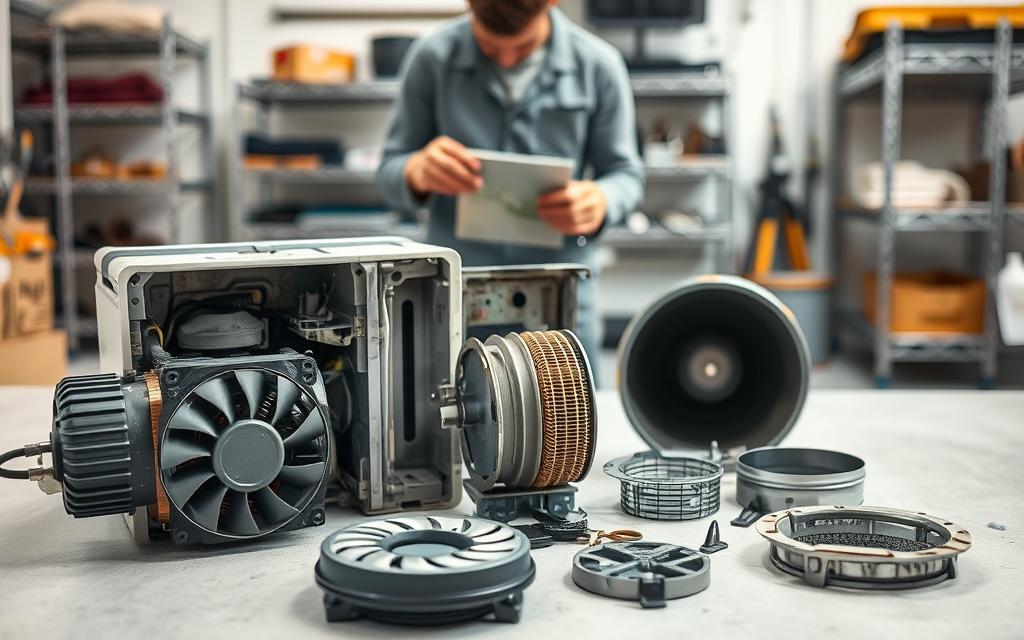
Finding a Recycling Company
Start by researching companies with EPA certification and positive reviews. Look for those specializing in appliance removal, like Jiffy Junk, which offers white-glove pickup services. Ensure they partner with RAD-certified facilities for legal refrigerant extraction.
- Check for EPA certification and customer feedback.
- Confirm they handle hazardous materials responsibly.
- Avoid companies that refuse to provide disposal receipts.
Scheduling a Pickup or Drop-Off
Once you’ve chosen a company, arrange a scheduling pickup or drop-off. Many services offer same-week availability, but advance bookings are recommended. Have your ID and appliance details ready for a smooth process.
For example, Jiffy Junk’s process includes a quick call to 844-543-3966, followed by a convenient pickup time. Fees typically range from $50 to $150, depending on location and service level.
Ensuring Safe and Responsible Disposal
Safe disposal involves verifying that the company follows EPA guidelines. Jiffy Junk ensures all units are transported upright to prevent leaks and processed at certified facilities. This guarantees compliance with environmental regulations.
By choosing professional removal, you protect the environment and avoid potential fines. Proper disposal also safeguards waste workers from exposure to hazardous materials like refrigerants and mercury.
Environmental Benefits of Recycling Dehumidifiers
Recycling outdated appliances offers significant environmental advantages. It reduces waste, conserves resources, and minimizes harmful emissions. By choosing responsible disposal methods, you contribute to a healthier planet and support sustainable living.
Resource Conservation Through Recycling
Recycling helps recover valuable materials like steel and copper. For example, reusing one ton of steel saves 2,500 pounds of iron ore. This process also reduces the need for mining, which can harm ecosystems.
Copper recovery rates can reach up to 90%, significantly lowering the demand for new resources. These efforts not only conserve raw materials but also reduce energy consumption during production.
Reduction of Greenhouse Gas Emissions
Proper disposal prevents harmful refrigerants like Freon from entering the atmosphere. Freon has a global warming impact 1,800 times greater than CO2. By recovering these substances, we reduce their contribution to climate change.
Landfills release methane, a potent greenhouse gas. Recycling diverts waste from landfills, helping meet the EPA’s emissions reduction targets. This step is crucial for combating global warming.
Preventing Hazardous Material Leakage
Old units often contain mercury, which can pollute 20 acres of water if leaked. Proper disposal ensures these toxins don’t contaminate soil or waterways. This protects marine life and prevents long-term ecological damage.
Community recycling drives have shown measurable success in reducing hazardous leakage. These initiatives highlight the importance of collective action in preserving our environment.
Conclusion
Responsibly managing the disposal of old appliances protects both the environment and your community. Proper preparation, choosing the right disposal methods, and verifying legal compliance are essential steps. Ignoring these can lead to fines and significant environmental harm.
Professional services like Jiffy Junk ensure safe Freon handling and hassle-free dehumidifier disposal. Their expertise guarantees compliance with regulations, protecting both you and the planet.
Take action today by contacting Jiffy Junk or local RAD-certified partners. Your choices contribute to a sustainable future, reducing waste and preserving resources for generations to come.
